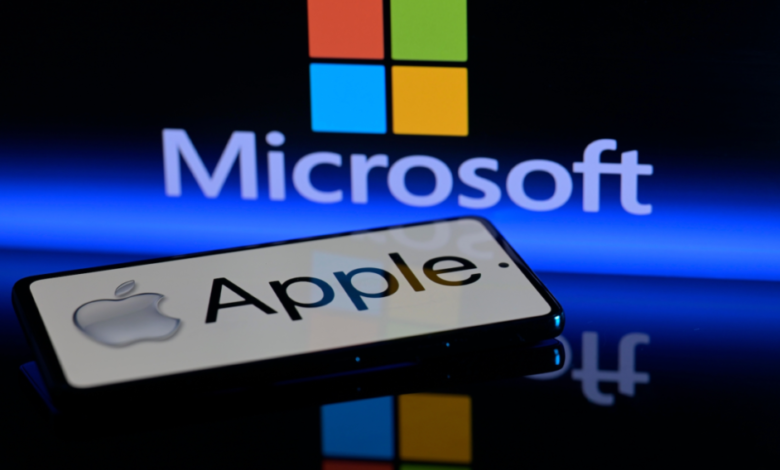Microsoft and Apple Step Back from OpenAI’s Board Amid Antitrust Concerns

While big tech companies are expanding acquisitions and receivablesRegulators express concerns about possible anti-competitive practices. FAMGA (Facebook, Apple, Microsoft, Google, Amazon) has invested $59 billion in AI research. The rapid growth of the influence of these companies has led to this new antitrust rules to focus on fair competition and avoid monopolistic behavior.
In a major move that reflects this growing criticism, Microsoft and Apple have decided to step down from OpenAI’s board, amid increased regulatory scrutiny from US, UK and European authorities.
In this blog we discuss the consequences of increased scrutiny of OpenAI, new digital surveillance and the impact on the wider industry.
Microsoft leaves OpenAI board
On July 10, 2024, Microsoft officially announced its departure from OpenAI’s board. In a letter, Keith Dolliver, Microsoft’s deputy general counsel, said: “We are confident in the direction of the company and have witnessed significant progress by the newly formed board over the past eight months, and we no longer believe that our limited role as an observer is necessary. ”
Microsoft was drawn to OpenAI’s board after a power struggle that briefly saw CEO Sam Altman fired played a key role in rehiring Sam Altman as CEO of OpenAI.
After recovering, Sam Altman announced Microsoft’s new role on the OpenAI board as a non-voting observer in his inaugural statement. This allowed Microsoft representatives to attend board meetings and access confidential information.
However, they would not have voting rights. This development, in addition to a Investment of $13 billionmade Microsoft OpenAI’s largest and most important investor.
The close ties between the two companies and Microsoft’s ability to access confidential information drew criticism from regulators over fair competition and market practices.
Regulators are investigating possible anti-competitive practices
Following the controversial temporary removal of OpenAI’s CEO in December 2023, the UK Competition and Markets Authority (CMA) started an investigation in the collaboration between Microsoft and OpenAI.
Similarly, the European Commission (EU) also requested more information on “certain exclusivity clauses” in Microsoft’s agreement with OpenAI that could harm competition. The head of the competition bureau, Margrethe Vestager, stressed that the EU will keep a close eye on the rapidly developing AI market.
The EU will place special emphasis on one area, called ‘Acquire-Hires’, where a company buys another area mainly to acquire its key talent.
“It’s hard not to conclude that Microsoft’s decision was heavily influenced by the ongoing competition and antitrust investigation.said a British lawyer Alex Haffner.
All this could lead to a delay in the development of innovative AI solutions needed for competitive advantage and threaten corporate reputation.
OpenAI’s response and governance changes
Following Microsoft’s withdrawal, OpenAI committed to increasing transparency with strategic partners and illuminating plans regulatory concerns and strengthen its governance.
“We are grateful to Microsoft for their continued support and we look forward to continuing our successful collaboration.says Steve Sharpe, a spokesperson for OpenAI.
However, OpenAI will no longer provide stakeholders with the role of non-voting governance observers. The company will adopt a new strategy to organize more frequent meetings with stakeholders to share progress and improve collaboration, especially in the areas of safety and security.
“Under the new leadership of CFO Sarah Friar, we plan to host regular meetings with partners such as Apple and Microsoft and key investors Khosla Ventures and Thrive Capital.Steve Sharpe announced.
Impact of Microsoft’s withdrawal from OpenAI’s board
With mounting pressure from antitrust authorities in the US, UK and EU, Microsoft’s departure from the OpenAI board helps ease regulatory concerns. By moving away from direct board involvement, the company can head off potential antitrust complications and maintain a positive relationship with regulators.
However, Microsoft’s departure will not worsen cooperation with OpenAI. It is still OpenAI’s largest investor, roughly controlling 49% of the ownership interest. In the future, the company plans to integrate OpenAI models into Office 365 and Azure products to provide better customer service.
Apple avoids the role of observer
With Microsoft’s departure, Apple also dropped plans to join OpenAI’s board as a non-voting observer. This development came despite Apple’s joint effort with OpenAIwhere the company planned to incorporate ChatGPT into Apple’s product range.
While Apple’s AI improvements have significantly improved Siri and machine learning capabilities, the tech giant prefers to avoid potential regulatory issues.
Broader industry trends
Supervisory authorities are becoming increasingly vigilant in investigating mergers and acquisitions (M&A) in the AI domain. The main US antitrust regulators currently are research into investments by Microsoft, Google and Amazon in startups such as OpenAI and Anthropic.
“Our investigation aims to determine whether the investments and alliances formed by these dominant companies have the potential to disrupt innovation and hinder fair competition,” said Lina Khan, head of the Federal Trade Commission (FTC).
The British competition regulator CMA is also investigating Microsoft has rehired the CEO of Inflection AI to determine whether this caused a “substantial reduction in competition” in the AI space.
The US Department of Justice (DOJ) also launched two separate investigations into Nvidia due to growing antitrust concerns surrounding their AI-focused business activities. Nvidia commands a Market share from 70% to 95% in the chips that are essential for training AI models.
This dominance has not escaped the attention of other international regulatory bodies. Last month, Reuters reported that Nivida may face antitrust charges in France.
A broader trend has emerged in the tech industry, where regulators are scrutinizing the acquisition of AI startups and technologies to discourage monopolistic behavior. Microsoft’s decision to leave the OpenAI board is seen as a proactive effort to avoid the perception that it is exerting undue influence over smaller companies.
However, technology companies will continue to collaborate with AI startups in various ways, such as providing financing, technical support and strategic advice.
Main results
With increasing scrutiny, tech giants must exercise more caution when investing in AI startups. Additionally, the OpenAI board shake-up and oversight presents an opportunity for tech companies to improve their governance protocols, strengthen partnerships, and proactively meet compliance obligations.
All this will contribute to the development and adoption of responsible and explainable AI.
Stay ahead in the ever-evolving world of artificial intelligence by visiting Unite.ai.






